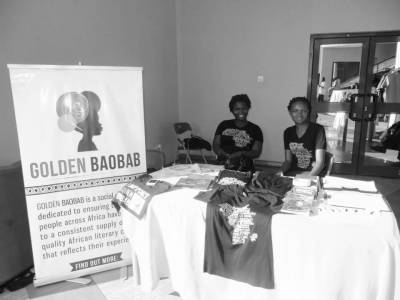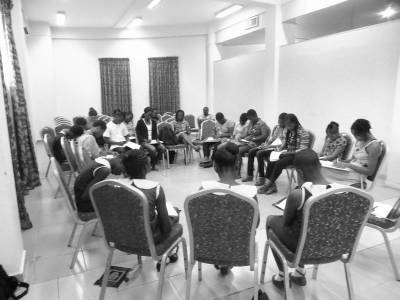
Hello everyone! This is Tiffany Morris; I’ll be working with Golden Baobab for the summer as a Strategic Development Fellow. This past weekend, I and the rest of the Golden Baobab team, had the opportunity to attend a great conference called Yari Yari Ntoaso that for me, illuminated some of the values that Golden Baobab is attempting to push into the world through our work.
For those who are not aware, Yari Yari Ntoaso is an international symposium on literature for women of African descent. This year marked the third occasion of the conference’s occurrence and the first time that it took place on the African continent. It really is a singular and unique gathering; from my count, there were women from over 30 countries and 5 continents at the conference, all of African descent and/or who are interested in literature in the African diaspora. I for one, had never been to, or even heard about anything like it. On the menu were a feast of panels to attend and of course, during the breaks, there was an abundance of interesting and talented women to meet and of stories from across the globe to hear, each of which could add a bit more color to our conception of the human experience. Best of all, the whole weekend was free and open to the public! I hope that those of you in Accra were able to attend but for those of you who weren’t able to make it, just check out the #yariyari Twitter hashtag for a glimpse of the community who attended that weekend. And below, find three things that stood out for me after attending the conference that related to Golden Baobab’s work:
1) There is a huge network of writers who need resources like those that Golden Baobab is seeking to make available.
Deborah Ahenkorah, Golden Baobab’s founder and Executive Director, had the opportunity to host a writer’s workshop for writers under the age of 20. Although the event was not heavily marketed, over 20 youth attended the workshop. After an introductory session and an open discussion about writing, the youth were instructed to freewrite for 20 minutes on a prompt that we suggested or on one of their own choosing. After only 20 minutes, many of the young people in the room produced material that with a bit of editing, would be desirable to any children’s or young adult fiction editor in the world!
The workshop served as a great illustration for me of why the Golden Baobab Prize for Rising Writers exists. Writing can be a solitary pursuit and without encouragement or a direction for their talent, young writers could easily stop writing. The Golden Baobab Rising Writer Prize is just one piece of the puzzle to keep talented young writers both committed to their craft and supported as they grow and refine their work.
For those who aren’t aware, the Golden Baobab Rising Writer Prize is awarded annually to a young African author under the age of 18 who demonstrates the talent and drive to become the next great African author for children. The winner receives $1, 000 (USD), the opportunity to publish with and receive royalties from Golden Baobab top tier African and international publishing partners, the benefit of increased publicity that comes with being named a Golden Baobab winner, opportunities to attend exclusive Golden Baobab workshops to learn and grow as future children's book writers, and also, the opportunity to serve on the panel for the Golden Baobab Prize.
2) There is a large, as yet untapped market for quality African children’s literature
Deborah Ahenkorah, Golden Baobab’s founder and president, had the privilege of presenting on a panel with scholars from the University of Lagos, University of Ghana and USC, titled, “African & Diaspora Children’s &Young Adult Literature, Now & in the Future.” One of the standout themes of that panel was that there aren’t enough children’s books written with characters of African or hyphenated African identity. The scholars also mentioned that reading stories at a young age that reflect a child’s experiences creates critical psychological benefits for children’s mental development. Currently, very few quality books are on the market that reflect the plethora of identity of children’s books consumers.
I saw anecdotal proof of this fact during the conference. In between panel sessions, Golden Baobab had a table where we sold t-shirts and our GeeBee bags filled with African children’s books. There was another table in the lobby area that was run by a large local bookseller that was also selling African children’s books. I was sad to see that the titles we were selling and the titles they were selling were the same! Moreover, the conference attendees already knew many of the titles that both we and the other booksellers had for sale, since there are so few stories with African children in print that it’s not difficult for someone with even a passing interest to quickly know them all.
Pair the above with the fact that the children’s book industry is growing every year and that Africa’s middle class is growing, and parents around the world increasingly want their children to have a global education (one that includes stories of children from every corner of the world, not just their own), and you can see that the market for African children’s literature is huge.
Despite the large demand and short supply of African children’s books available, the current publishing and distribution infrastructure produces few new books with African children protagonists each year. Golden Baobab’s production and distribution plans will help to solve this problem.
3) There are more stories to be told than we are currently telling
Many, many writers were at the conference, most of whom I had never heard of but who, after meeting, I wanted to know more about. This was in part because throughout every presentation and conversation, stories were told. This was, after all a gathering of natural storytellers. For example, in the opening plenary session, renowned author Ama Ata Aidoo, told a story about the influence that her co-speaker, Angela Davis, had on Ghana when it became the first independent nation in Africa. She spoke of how her brother shook when he found out that she, Mrs. Aidoo, would be presenting with Ms. Davis at Yari Yari. There were also tales from Haiti about the American occupation there and stories from Virginia about the relationship between mothers and daughters. Each of these stories was told movingly and powerfully and it was struck me that these storytellers, and the many that I didn’t hear, need more platforms for their voice.
The founder of Yari Yari admonished us to, “find your voice and use it.” Though our Prize, publishing and distribution streams, Golden Baobab is helping to make it easier for these voices to be heard.


